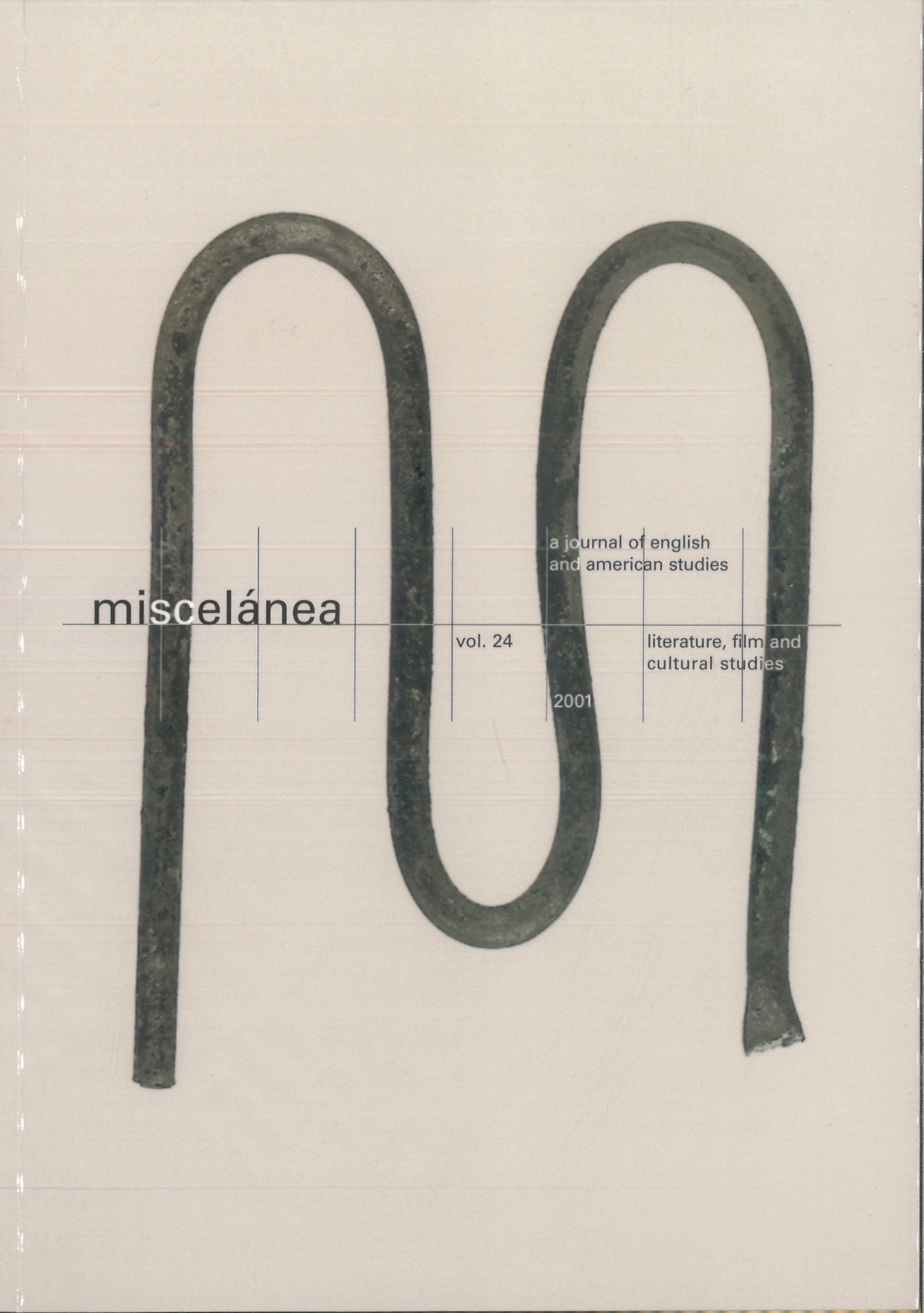Unreliable Narration and (Dis-)Orientation in the Postmodern Neo-Gothic Novel: Reflections on Patrick McGrath's The Grotesque (1989)
DOI:
https://doi.org/10.26754/ojs_misc/mj.200110263Palabras clave:
Narratología, Novela neogótica, Estudios culturales, PostmodernismoResumen
Este artículo analiza las formas y funciones de la narración poco fiable en una novela neogótica posmoderna y, de este modo, intenta contemplar el fenómeno del narrador poco fiable no sólo desde el punto de vista del narratólogo que pretende elaborar una definición descriptiva hermética de la técnica y situarla de forma coherente dentro de un marco conceptual. Se trata más bien de aunar la narratología y los estudios culturales en un intento de determinar las funciones culturales de una forma especial de narración en una situación histórica a menudo descrita como plural, fragmentada y carente de un centro, es decir, que crea problemas de orientación. Así pues, la narración no fiable resulta ser una herramienta útil en el proceso artístico de hacer frente a la condición posmoderna.
Descargas
Citas
ALLRATH, Gaby. 1998. “But why will you say that | am mad? Textuelle Signale fir die Ermittlung voN unreliable narration”. In Niinning. 1998: 59-79.
ANTOR, Heinz. 1992. “Ethical Plurivocity; or, The Pleasures and Rewards of Reading”. In Ahrens, Riidiger and Heinz Antor. (eds.). Text-Culture-Reception: Cross-Cultural Aspects of English Studies. Heidelberg: Universitatsverlag C. Winter: 40. :
—. 1996. “The Ethics of Criticism in the Age After Value”. In Volkmann, Laurenz and Riidiger Ahrens. (eds.). Why Literature Matters: Theories and Functions of Literature. Heidelberg: Universitatsverlag C. Winter: 65-85.
—. 1997. “Sozialisation zwischen Norm und Tabubruch: lan McEwans Roman The Cement Garden als Lektiire im Leistungskurs Englisch”. LWU 30, 4: 267-286.
—. 1998. “The Arts, the Sciences, and the Making of Meaning. Tom Stoppard’s Arcadia as a Post-Structuralist Play”. Anglia 116, 3: 326-354.
—. 2000. “Is there a Ship on the Horizon? Notes on the Ethics of Dennis Potter’s New Humanist Postmodernism in Sufficient Carbohydrate”. In Gras, Vernon W. and John R. Cook. (eds.). 2000. The Passion of Dennis Potter: International Collected Essays. New York: St. Martin’s Press: 127-148.
BOTTING, Fred. 1996. Gothic. The New Critical idiom. London: Routledge.
CHATMAN, Seymour. 1990. Coming to Terms: The Rhetoric of Narrative in Fiction and Film. Ithaca/London: Cornell U. P.
FLUDERNIK, Monika. 1999. “Defining (In)sanity: The Narrator of The Yellow Wallpaper and the Question of Unreliability”. In Grinzweig, Walter and Andreas Solbach. (eds.). Narratologie, Rhetorik, Textlinguistik: Ein Integrationsversuch. Tubingen: Narr: 75-95.
FÜGER, Wilhelm. 1983. “Mikronarrativik”. GRM 33, 2: 179. HOF, Renate. 1980. “Das Spiel des unreliable narrator in Nabokov's Lolita”. Amerikastudien 25, 4: 418-431.
—. 1984. Das Spiel des ‘unreliable narrator’: Aspekte unglaubwirdigen Erzahlens im Werk von Viadimir Nabokov. Miinchen: Fink.
LEMONCK, Michael D. 1998. “A Dinosaur with Guts”. Time, April 6: 57.
MCGRATH, Patrick. (1989) 1990. The Grotesque. Harmondsworth: Penguin.
Morrow, Bradford. 1989. “Patrick McGrath”. BOMB 28: 30-31.
NUNNING, Ansgar. 1993. “Renaissance eines anthropomorphisierten Passepartouts oder Nachruf auf.ein literaturkritisches Phanomen? Uberlegungen und Alternativen:zum Konzept des implied author’. Deutsche Vierteljahresschrift 67, 1: 1-25.
—-. 1998. Unreliable Narration: Studien zur Theorie und Praxis unglaubwiirdigen Erzdhlens in der englischsprachigen Literatur. Trier: WVT.
POE, Edgar Allan. 1967. “The Fall of the House of Usher”. In Poe, E. A. 1967. Selected Writings. Ed. D. Galloway. Harmondsworth: Penguin.
REUCK, Jenny De. 1990. “Stereoscopic Perspectives: Transmission and Reception in Unreliable Homodiegetic Narration”. AUMLA: Journal of the Australasian Universities Language and Literature Association 74: 154-168.
SEDYLMAYR, Hans. (1948) 1985. Verlust der Mitte: Die bildende Kunst des 19. und 20. Jahrhunderts als Symptom und Symbol der Zeit. Frankfurt/M., Berlin, Wien: Ullstein.
SHEN, Dan. 1989, “Unreliability and Characterization”. Style 23: 300-311.
SHKLOVSKY, Viktor. 1988. “Art as Technique”. In Lodge, David. (ed.). 1988. Modern Criticism and Theory: A Reader. London, New York: Longman: 16-30.
SIMS, Dagmar. 1998. “Die Darstellung grotesker Welten aus der Perspektive verriickter Monologisten: Eine Analyse erzahlerischer und mentalstilistischer Merkmale des Erzahlertypus mad monologist bei Edgar Allan Poe, Patrick McGrath, Ambrose Bierce und James Hogg”. In Ninning. 1998: 109-129.
TAYLOR, Charles. 1989. Sources of the Self: The Making of the Modern Identity. Cambridge: Cambridge U. P.
THOMSEN, Christian W. 1974. Das Groteske im englischen Roman des 18, Jahrhunderts: Erscheinungsformen und Funktionen. Impulse der Forschung 17. Darmstadt: Wissenschaftliche Buchgesellschaft.
WALL, Kathleen. 1994. “The Remains of the Day and Its Challenges to Theories of Unreliable Narration”. Journal of Narrative Technique 24: 18-24,
YACOBI, Tamar. 1981. “Fictional Reliability as a Communicative Problem”. Poetics Today 8, 2: 113-126.
YEATS, William Butler. 1974. Selected Poetry. London: Pan Books.
Descargas
Publicado
Cómo citar
Número
Sección
Licencia

Esta obra está bajo una licencia internacional Creative Commons Atribución-NoComercial 4.0.


